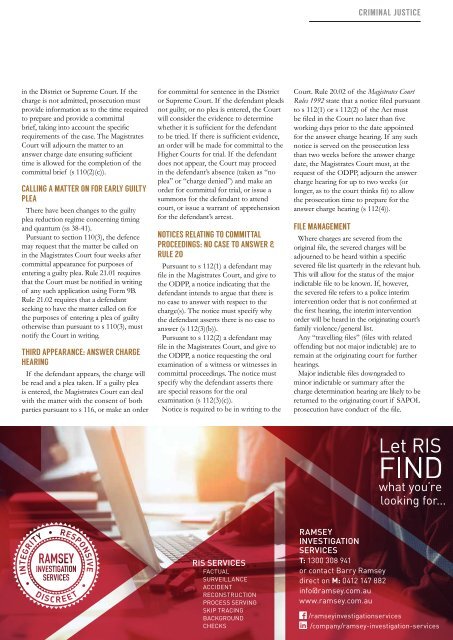LSB July 2018_Web
Create successful ePaper yourself
Turn your PDF publications into a flip-book with our unique Google optimized e-Paper software.
CRIMINAL JUSTICE<br />
in the District or Supreme Court. If the<br />
charge is not admitted, prosecution must<br />
provide information as to the time required<br />
to prepare and provide a committal<br />
brief, taking into account the specific<br />
requirements of the case. The Magistrates<br />
Court will adjourn the matter to an<br />
answer charge date ensuring sufficient<br />
time is allowed for the completion of the<br />
committal brief (s 110(2)(c)).<br />
CALLING A MATTER ON FOR EARLY GUILTY<br />
PLEA<br />
There have been changes to the guilty<br />
plea reduction regime concerning timing<br />
and quantum (ss 38-41).<br />
Pursuant to section 110(3), the defence<br />
may request that the matter be called on<br />
in the Magistrates Court four weeks after<br />
committal appearance for purposes of<br />
entering a guilty plea. Rule 21.01 requires<br />
that the Court must be notified in writing<br />
of any such application using Form 9B.<br />
Rule 21.02 requires that a defendant<br />
seeking to have the matter called on for<br />
the purposes of entering a plea of guilty<br />
otherwise than pursuant to s 110(3), must<br />
notify the Court in writing.<br />
THIRD APPEARANCE: ANSWER CHARGE<br />
HEARING<br />
If the defendant appears, the charge will<br />
be read and a plea taken. If a guilty plea<br />
is entered, the Magistrates Court can deal<br />
with the matter with the consent of both<br />
parties pursuant to s 116, or make an order<br />
for committal for sentence in the District<br />
or Supreme Court. If the defendant pleads<br />
not guilty, or no plea is entered, the Court<br />
will consider the evidence to determine<br />
whether it is sufficient for the defendant<br />
to be tried. If there is sufficient evidence,<br />
an order will be made for committal to the<br />
Higher Courts for trial. If the defendant<br />
does not appear, the Court may proceed<br />
in the defendant’s absence (taken as “no<br />
plea” or “charge denied”) and make an<br />
order for committal for trial, or issue a<br />
summons for the defendant to attend<br />
court, or issue a warrant of apprehension<br />
for the defendant’s arrest.<br />
NOTICES RELATING TO COMMITTAL<br />
PROCEEDINGS: NO CASE TO ANSWER &<br />
RULE 20<br />
Pursuant to s 112(1) a defendant may<br />
file in the Magistrates Court, and give to<br />
the ODPP, a notice indicating that the<br />
defendant intends to argue that there is<br />
no case to answer with respect to the<br />
charge(s). The notice must specify why<br />
the defendant asserts there is no case to<br />
answer (s 112(3)(b)).<br />
Pursuant to s 112(2) a defendant may<br />
file in the Magistrates Court, and give to<br />
the ODPP, a notice requesting the oral<br />
examination of a witness or witnesses in<br />
committal proceedings. The notice must<br />
specify why the defendant asserts there<br />
are special reasons for the oral<br />
examination (s 112(3)(c)).<br />
Notice is required to be in writing to the<br />
Court. Rule 20.02 of the Magistrates Court<br />
Rules 1992 state that a notice filed pursuant<br />
to s 112(1) or s 112(2) of the Act must<br />
be filed in the Court no later than five<br />
working days prior to the date appointed<br />
for the answer charge hearing. If any such<br />
notice is served on the prosecution less<br />
than two weeks before the answer charge<br />
date, the Magistrates Court must, at the<br />
request of the ODPP, adjourn the answer<br />
charge hearing for up to two weeks (or<br />
longer, as to the court thinks fit) to allow<br />
the prosecution time to prepare for the<br />
answer charge hearing (s 112(4)).<br />
FILE MANAGEMENT<br />
Where charges are severed from the<br />
original file, the severed charges will be<br />
adjourned to be heard within a specific<br />
severed file list quarterly in the relevant hub.<br />
This will allow for the status of the major<br />
indictable file to be known. If, however,<br />
the severed file refers to a police interim<br />
intervention order that is not confirmed at<br />
the first hearing, the interim intervention<br />
order will be heard in the originating court’s<br />
family violence/general list.<br />
Any “travelling files” (files with related<br />
offending but not major indictable) are to<br />
remain at the originating court for further<br />
hearings.<br />
Major indictable files downgraded to<br />
minor indictable or summary after the<br />
charge determination hearing are likely to be<br />
returned to the originating court if SAPOL<br />
prosecution have conduct of the file.<br />
<strong>July</strong> <strong>2018</strong> THE BULLETIN 37


















